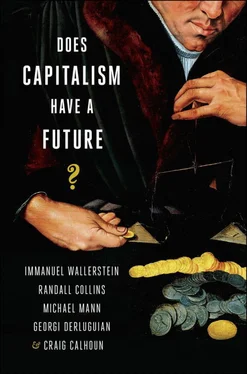Immanuel Wallerstein - Does Capitalism Have a Future?
Здесь есть возможность читать онлайн «Immanuel Wallerstein - Does Capitalism Have a Future?» весь текст электронной книги совершенно бесплатно (целиком полную версию без сокращений). В некоторых случаях можно слушать аудио, скачать через торрент в формате fb2 и присутствует краткое содержание. Город: New York, Год выпуска: 2013, ISBN: 2013, Издательство: Oxford University Press, Жанр: Публицистика, sci_economy, на английском языке. Описание произведения, (предисловие) а так же отзывы посетителей доступны на портале библиотеки ЛибКат.
- Название:Does Capitalism Have a Future?
- Автор:
- Издательство:Oxford University Press
- Жанр:
- Год:2013
- Город:New York
- ISBN:978-0-19-933084-3
- Рейтинг книги:5 / 5. Голосов: 1
-
Избранное:Добавить в избранное
- Отзывы:
-
Ваша оценка:
- 100
- 1
- 2
- 3
- 4
- 5
Does Capitalism Have a Future?: краткое содержание, описание и аннотация
Предлагаем к чтению аннотацию, описание, краткое содержание или предисловие (зависит от того, что написал сам автор книги «Does Capitalism Have a Future?»). Если вы не нашли необходимую информацию о книге — напишите в комментариях, мы постараемся отыскать её.
Does Capitalism Have a Future? — читать онлайн бесплатно полную книгу (весь текст) целиком
Ниже представлен текст книги, разбитый по страницам. Система сохранения места последней прочитанной страницы, позволяет с удобством читать онлайн бесплатно книгу «Does Capitalism Have a Future?», без необходимости каждый раз заново искать на чём Вы остановились. Поставьте закладку, и сможете в любой момент перейти на страницу, на которой закончили чтение.
Интервал:
Закладка:
The transition from village to town as the main organizing locus of human life appears irreversible. Its implications help explain why the crisis of capitalism is so hard to solve. Something must step in to resume the comprehensive provision of normative order, social regulation, daily security and welfare in the new agglomerations of humanity. Moreover, these tasks must be now performed not only on a vastly larger scale but also better than the villages used to do. Lest we forget, villages provided intimate coziness and shelter that meant, by extension, intrusive supervision and the social caging of individuals. The protective inertia of traditions, the inequalities of age and sex inscribed in the patriarchal households, the denigrating and violently vengeful attitudes toward strangers and outsiders were part and parcel of village life, too.
The modern history of mass migrations, demographic transitions, and the creation of new political communities brought enormous costs and traumas. The overseas emigration of European settlers helped to improve the ratio of demographics to resources at the cost of the displacement, enslavement, and downright extermination of the indigenous peoples in the colonies who lacked guns and immunity to the germs brought by the invaders. The emergence of modern nations often implied the oppression and expulsion of the “non-national” minorities. After 1914 the radical mutation of nationalism into militarist and virulently populist strains of fascism escalated the same historical vectors into the Holocaust. In a different kind of radical escalation, the Soviet collectivization of agriculture sacrificed human lives by the millions for the sake of achieving industrialization and modern life for the children of survivors. Only after 1945 were the former peasants and working classes of the West and Soviet bloc factored into social security and prosperity by their national states. In total, this amounted to several hundred millions of people. But are there now the resources, let alone political will, to factor in several billion people from the global South?
Enthusiasts of globalization hail our moving into a global village. This sanguine claim should be evaluated soberly. Cosmopolitanism is a longstanding project that has had its liberal and socialist versions. [5] More in Craig Calhoun, Nations Matter: Culture, History and the Cosmopolitan Dream . New York: Routledge, 2007.
But it means something different as a complement to a world of stable states. And there exist other, more conservative projects for directing globalization that derive their energies from imperialist ambitions, nationalisms, anti-immigrant rejections, religious fundamentalism, and their combinations. The very possibility of an arena of global governance and a common human identity may well become the main focus of political contention in the coming decades. The outcome is too early to predict. Systemic crisis at a world scale will sow havoc, panic, and nasty reactions. But it will also elicit collective coping strategies going in the direction of a more democratically accountable, organizationally flexible, and capable global governance. Humanity can still escape a catastrophic backslide in the complexity and extent of its collective organization. Perhaps enough lessons of twentieth-century revolutionary and socially reformist movements have withstood the neoconservative ravages of recent decades. Or it could be something profoundly changing in the complex and contradictory institutional architecture of the modern states themselves. At the very least, here is yet another topic for fruitful investigation by social scientists.
We are reluctant to call the “state,” let alone “global state,” the political structure of a better future. This is in fact the biggest unknown. Let us make just a couple of observations regarding the pattern of politics in a more hopeful future. Most of us doubt that existing international organizations add up to the prototype of such structures. The United Nations, the European Union, the IMF, Davos, G-8, G-20 and other such clubs belong to the epoch of capitalist integration and American hegemony. At present these institutions are weakened or compromised by political manipulation and technocratic aloofness. Some of us, however, see the only solution to environmental crisis in a much stronger network of relations between states—a Super United Nations. Others of us doubt that this political integration can be achieved fast enough, and it is not without its own worries. Still, the post-1945 epoch of relative world peace and prosperity set an important precedent that may prove more lasting than its political institutions.
The changing structures and directions of future politics will surely deliver big surprises. The majority of people regard extension of prior experience as most plausible. The inexorable growth of national states has been indeed a major reality during the entire modern period. But what if the novel recombination of seemingly familiar factors at a planetary level turns out differently? After all, this is exactly what Randall Collins argues regarding the newest technological displacement. Although none of us considers anarchism a very realistic strategy, we must admit that the antiestablishment spirit of 1968 proved one of its most enduring legacies, both on the left and on the right. Perhaps this calls for taking more seriously the values and organizational alternatives represented by the nonstatist movements tenaciously surviving in the margins. The major transformative mobilizations of state powers and peoples in modern times have been associated with wars and violent revolutions. Anarchist or libertarian calls could not be politically effective in such situations. But what if the future delivers a major nonmilitary emergency, be it frightening extinctions of biological species or middle-class jobs? Let us seriously consider what makes us believe that states or interstate alliances will prove up to the task of organizing billions of people for the altruistic enterprise of planting trees and developing new technologies or educating the children, caring for the elderly, and overall sustaining life? A self-organizing dynamic might become rather the order of the day. Who knows? This might even open common grounds for bridging the hostility between the popular movements now raging on the right and left. Here we may identify another moving front of social science inquiry into the dynamics of contemporary ideology and popular politics.
SOCIAL SCIENCE IN A TRANSFORMATIVE FUTURE
Are political hopes blurring our theoretical visions? Our answer is this: Reflexively admitting a connection between our hopes and our hypotheses is a necessary component of theoretical honesty in social science, especially when dealing with our own times. Social theory is often likened to lenses of various cuts that enable us to discern patterns in human action. When the lenses are cut solely to confirm one’s faith and denounce whatever opposes it, the resulting vision is strictly ideological. Such lenses, commonly worn in politics and public debating, function more like blinders. Theory is different because it has to be testable. What constitutes tests in social science has been a matter of controversy. We are methodological pluralists insofar as we doubt attempts to legislate the one right way of doing social science. Yet we are not complete relativists. Different kinds of problems and scales of analysis leave researchers the choice of investigative techniques. Experiments and statistical correlations have an important place in the toolkit of social science but their role cannot be universal. Disciplined ethnographic observation is often more revealing in studying localized social environments. At the macrohistorical level, which is where we work, the main method might be likened to connecting the dots in a big puzzle. Another test for macrohistorical theory are counterfactuals, the alternative roads that seemed possible at one historical juncture but were not taken. In other words, we must show both how we get from one historical situation to another and what are the actual range of structural possibilities and the factors on which events turn. This is perhaps as close we can get to an experiment in our kind of research.
Читать дальшеИнтервал:
Закладка:
Похожие книги на «Does Capitalism Have a Future?»
Представляем Вашему вниманию похожие книги на «Does Capitalism Have a Future?» списком для выбора. Мы отобрали схожую по названию и смыслу литературу в надежде предоставить читателям больше вариантов отыскать новые, интересные, ещё непрочитанные произведения.
Обсуждение, отзывы о книге «Does Capitalism Have a Future?» и просто собственные мнения читателей. Оставьте ваши комментарии, напишите, что Вы думаете о произведении, его смысле или главных героях. Укажите что конкретно понравилось, а что нет, и почему Вы так считаете.












